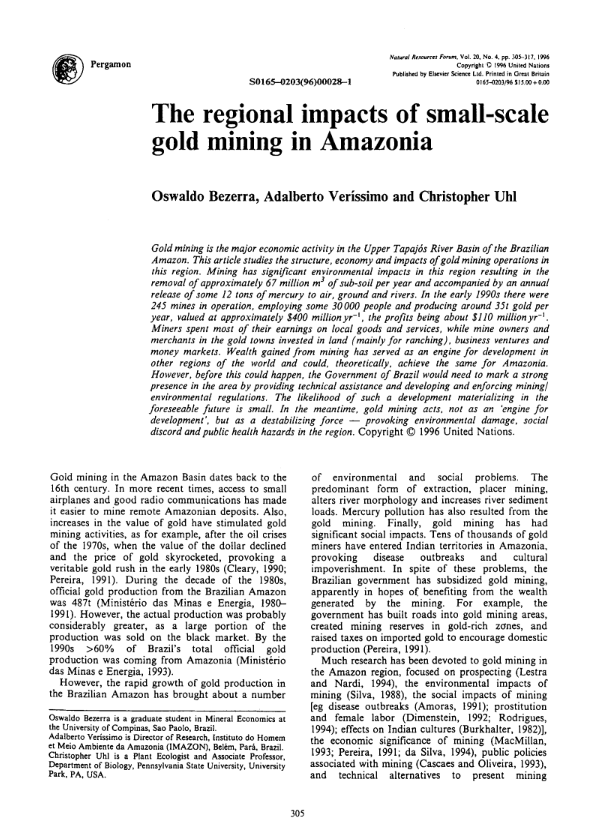

| Título | The regional impacts of small-scale gold mining in Amazonia |
| Autores | Oswaldo Bezerra Adalberto Veríssimo Christopher Uhl |
| Vinculação dos autores | (a) Universidade de Campinas – São Paulo (SP), Brasil (b) Instituto do Homem e Meio Ambiente da Amazônia (Imazon) – Belém (PA), Brasil (c) Pennsylvania State University, University Park, PA, USA |
| Ano de publicação | 1996 |
| Meio de publicação | Natural Resouces Forum (Volume 20, Issue 4, November 1996, Pages 305-317) |
| DOI (Digital Object Identifier) | https://doi.org/10.1111/j.1477-8947.1996.tb00663.x |
Gold mining is the major economic activity in the Upper Tapajós River Basin of the Brazilian Amazon. This article studies the structure, economy and impacts of gold mining operations in this region. Mining has significant environmental impacts in this region resulting in the removal of approximately 67 million m3 of sub-soil per year and accompanied by an annual release of some 12 tons of mercury to air, ground and rivers. In the early 1990s there were 245 mines in operation, employing some 30000 people and producing around 35t gold per year, valued at approximately $400 million yr-1, the profits being about $110 million yr-1. Miners spent most of their earnings on local goods and services, while mine owners and merchants in the gold towns invested in land (mainly for ranching), business ventures and money markets. Wealth gained from mining has served as an engine for development in other regions of the world and could, theoretically, achieve the same for Amazonia. However, before this could happen, the Government of Brazil would need to mark a strong presence in the area by providing technical assistance and developing and enforcing mining/environmental regulations. The likelihood of such a development materializing in the foreseeable future is small. In the meantime, gold mining acts, not as an ‘engine for development’, but as a destabilizing force — provoking environmental damage, social discord and public health hazards in the region.
This post was published on 1 de novembro de 1996
Amorim, L., Ferreira, R., Dias, M., Souza Jr., C., & Veríssimo, A. Sistema de Alerta…
Título Índice de Progresso Social Brasil 2025 Autores Melissa Wilm Daniel Santos Beto Veríssimo Marcelo…
Amorim, L., Ferreira, R., Dias, M., Souza Jr., C., & Veríssimo, A. Sistema de Alerta…
Título Relatório Anual do Desmatamento no Brasil - RAD2024 Autores Carolina Del Lama Julia Shimbo…
Título Fatos da Amazônia 2025 Autores Daniel Santos Manuele Lima Agatha Vilhena Beto Veríssimo Caíque…
Amorim, L., Ferreira, R., Dias, M., Souza Jr., C., & Veríssimo, A. Sistema de Alerta…